
Companies must evolve or die
"nearly 40% of CEOs think their company will no longer be economically viable a decade from now, if it continues on its current path"
Summary: Forty percent of global CEOs think their organisation will no longer be economically viable in ten years’ time, if it continues on its current course. Roughly 40% flagged the transition to new energy sources and supply chain disruption.
Why this is important: Rather than focusing on the negative aspects of 'polycrisis' we read the survey results as a reflection that many CEO's know they need to change making them more open to constructive engagement.
The big theme: Organisations are facing what could be described as unprecedented change. We have become used to our financial choices, the companies we lend to or invest in, or the projects we select for our company to undertake, to be undertaken in a world that looks pretty much like the past. Change happens, but it has normally been incremental. Sources of competitive advantage remain fairly stable. But, that pattern is breaking. Much like the situation that Nokia faced in the mid 2000's, when the first smart phones emerged, companies across a wide range of sectors increasingly know that the environmental and social pressures they are facing will permanently change their industries. Their choice is simple, adapt and evolve, or fade away.

The details
As a rule, I normally avoid stories that have been published in the FT (assuming that many of you will have already read or at least skimmed them) or surveys from consultancy firms (sorry - but they are normally just promotions for their services).
But the recent PwC Global CEO survey, published on the 16 Jan and covered in the FT, grabbed my attention. This was at least partly prompted by a LinkedIn post from Nawar Alsaadi, a Toronto based portfolio manager.
To quote the report ..."nearly 40% of CEOs think their company will no longer be economically viable a decade from now, if it continues on its current path".
Summary of a story from the PwC Global CEO survey
Forty percent of global CEOs think their organisation will no longer be economically viable in ten years’ time, if it continues on its current course. That stark data point underscores a dual imperative facing 4,410 CEOs from 105 countries and territories who responded to PwC’s 26th Annual Global CEO Survey. Most of those CEOs feel it’s critically important for them to reinvent their businesses for the future. They also face daunting near-term challenges, starting with the global economy, which nearly 75% believe will see declining growth during the year ahead.
When asked about the forces most likely to impact their industry’s profitability over the next ten years, about half or more of surveyed CEOs cited changing customer preferences, regulatory change, skills shortages and technology disruption. Roughly 40% flagged the transition to new energy sources and supply chain disruption. And nearly one-third pointed to the potential for new entrants from adjacent industries.
Why this is important
One of the buzzword's of 2022 was polycrisis, its a bit headline grabbing, but you know what they are trying to say. We suspect that this sense of multiple challenges, for companies and investors, will continue through this decade. And many of the these will relate, directly or indirectly, to the various environmental and social changes that are fundamentally impacting what makes a good project or investment.
Much of the commentary on the PwC report, including in an FT article, focused on the negative aspect. To paraphrase - they contrasted the apparent negativity of the CEO's with the slowly brightening economic outlook, asking what were CEO's so worried about.
I think this is totally the wrong reading. As many of you know, I normally hate to be overly positive, but in this case I think the results reflect the fact that many CEO's know they need to change, because the outside world is changing on them, and changing fast. This makes them more open to constructive engagement.
Lets park for a moment the headline grabbing nature of these reports, and the lack of context (is this better or worse than say 3 years ago?).
This result doesn't really come as a surprise to me. I am sure many of you will see company CEO's as being optimistic people, who always see a positive and profitable future for their companies (and themselves). And this is generally the external persona they present. After all, who would lend to, invest in, or work for, a company where the CEO was constantly expressing doubts ?
My experience has been different. As some of you may know, I spent many years working for a large US based asset manager. In this role I got to know a large number of CEO's and I often found that, once you had gained their trust, that many of them were often concerned about the future. This was more common in Europe than in US, but generally I found that, at least in private, CEO's were pretty honest about the challenges their companies faced. This characteristic actually made discussing the company strategy and future positioning in the market easier than you might have first imagined.
Returning to the survey, seven challenges occurred in many responses.
- Changing customer demand / preferences
- Changes in regulation
- Labour / skills shortages
- Technology disruptors (e.g. advanced tech, AI, metaverse, blockchain)
- Supply chain disruption
- Transition to new energy sources
- New entrants to my industry from adjacent industries
I suspect that some human bias might be at play with the order of these concerns, especially given the recent events (COVID, economic slowing and supply chain disruption). This seems to be supported by the geographic nature of the responses, with "CEOs in Japan (who have been buffeted by demographic headwinds for decades) and China (who are on the front lines of uncertainties about free-flowing global trade) were the most concerned about the long-term viability of their business models, while CEOs in the United States were the most optimistic".
What is more interesting to me is to think about what threats might become more important over the next decade. If I was betting man I would look for the threats lower down the list to move up. I can see the transition to new energy sources (which I take as a short hand for all of the related net zero type transitions), and the risk of new entrants, getting greater attention.
Put simply, the transitions we face are going to change most companies business models, one way or another.
The good news is that many companies are preparing for these changes. The bad news is that by and large the preparations are not advancing fast enough. I expect a combination of social pressure, and the subsequent consequence of greater government regulation, to begin to force companies to either up their rate of change or start to materially fall behind. We don't know how quickly this will happen, but the sensible thing for companies to do is prepare now. The alternative is that a competitor will emerge, often from where you least expect it, to destroy their businesses profitability. And then they will be playing catch up, not a great place to be.
Putting it another way, inaction by management teams and boards is the choice that is most likely to make the concern that "their company will no longer be economically viable a decade from now" become real.
Something a little more bespoke?
Get in touch if there is a particular topic you would like us to write on. Just for you.
Contact us
Please read: important legal stuff.

